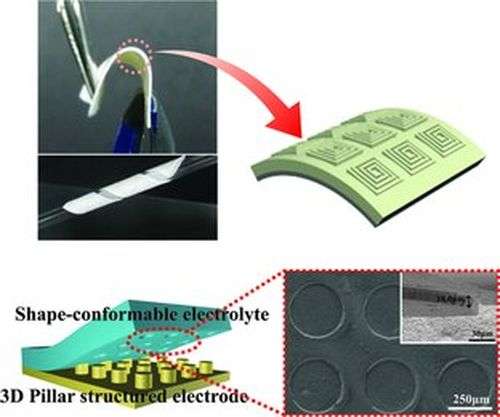January 17, 2013 weblog
South Korea carries news of bendable, shape-conformable batteries

(Phys.org)—A team of researchers from South Korea have developed bendable polymer electrolytes for lithium ion batteries. The Yonhap News Agency carried the announcement, which has led to numerous suggestions, along with the authors' intent, that their work could bring flexible phones and tablets that much closer to consumer reach. The researchers, led by Professor Lee Sang-young of South Korea's Ulsan National Institute of Science and Technology, along with researchers from nine other institutes, have authored a paper presenting their findings, titled "Imprintable, Bendable, and Shape-Conformable Polymer Electrolytes for Versatile-Shaped Lithium-Ion Batteries."
"We hope our paper helps the early commercialization of flexible mobile devices and safer battery use," he said. The team's paper was published online in December by Advanced Materials. The authors stated that "a class of imprintable, bendable, and shape-conformable polymer electrolyte with excellent electrochemical performance in lithium battery system is reported."
A bendable shape-conforming lithium, ion battery would eliminate dependence on hard, rectangular form factors in batteries, supporting development efforts for flexible smartphones. According to the authors, "The unique structural design and well-tuned rheological characteristics of the UV-curable electrolyte mixture, in combination with direct UV-assisted nanoimprint lithography, allow the successful fabrication of polymer electrolyte in geometries not accessible with conventional materials."
Reporting on the breakthrough, JoonAng Daily said that bendable lithium ion batteries also present an advantage in bringing about better efficiency in rechargeable batteries.
The work from Professor Lee and team is a departure from conventional batteries placed into inflexible cases. The material that the researchers used consists of, according to the team, " a UV-cured polymer matrix, high-boiling point liquid electrolyte, and Al2O3 nanoparticles, formulated for use in lithium-ion batteries with 3-D-structured electrodes or flexible characteristics."
JoongAng Daily described the team's process as something like "spreading jam on bread," in the spreading of fluid-like electrolytes on electrodes and exposing them to ultraviolet rays for 30 seconds, to create the new rechargeable battery.
The Ministry of Education, Science and Technology, in the announcement, emphasized safety as another factor marking this as a step forward. Conventional lithium-ion batteries that use liquefied electrolytes have safety problems, as the film that separates electrolytes may melt under heat, in which case the positive and negative may come in contact, causing an explosion, said the Ministry. "Because the new battery uses flexible but solid materials, and not liquids, it can be expected to show a much higher level of stability than conventional rechargeable batteries."
More information: Imprintable, Bendable, and Shape-Conformable Polymer Electrolytes for Versatile-Shaped Lithium-Ion Batteries, Advanced Materials, onlinelibrary.wiley.com/doi/10 … a.201204182/abstract
Abstract
A class of imprintable, bendable, and shape-conformable polymer electrolyte with excellent electrochemical performance in lithium battery system is reported. The material consists of a UV-cured polymer matrix, high-boiling point liquid electrolyte, and Al2O3 nanoparticles, formulated for use in lithium-ion batteries with 3D-structured electrodes or flexible characteristics. The unique structural design and well-tuned rheological characteristics of the UV-curable electrolyte mixture, in combination with direct UV-assisted nanoimprint lithography, allow the successful fabrication of polymer electrolyte in geometries not accessible with conventional materials.
Journal information: Advanced Materials
© 2013 Phys.org





















